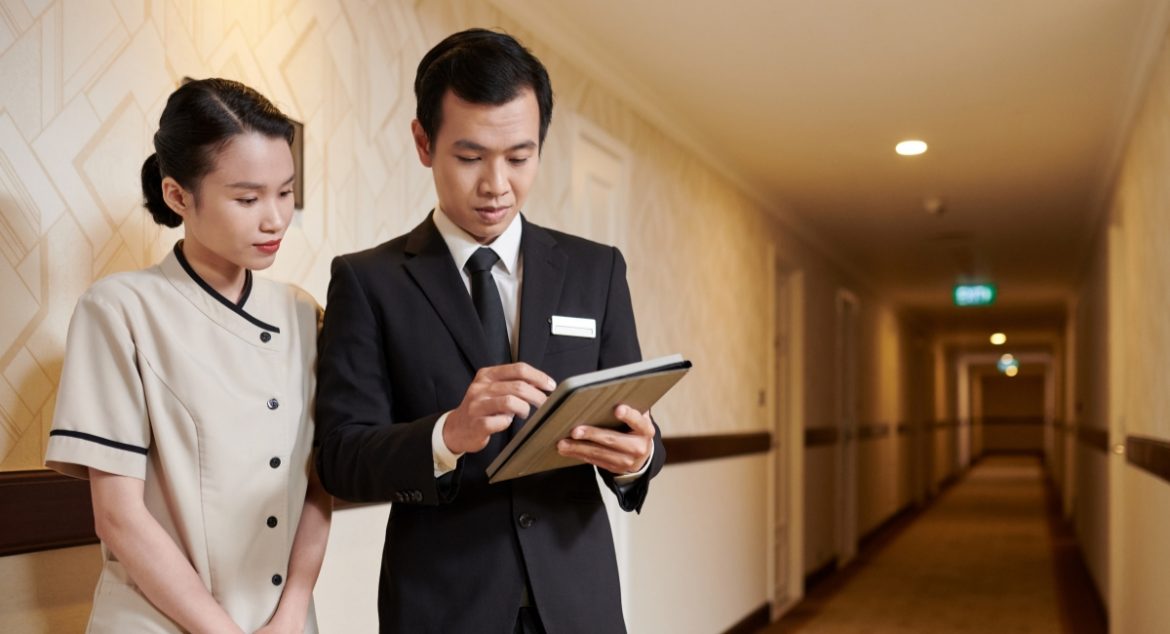The global hospitality industry is predicted to undergo substantial growth and innovation in 2024. Research and Markets’ report estimates the market size of the hospitality industry to increase from $4673.63 billion in 2023 to $4993.71 billion in 2024, at a compound annual growth rate (CAGR) of 6.8%.
This growth is expected to lead to a significant adoption of hospitality technologies, such as cloud-based Property Management Systems (PMS), artificial intelligence, virtual reality, and smart devices. These technologies will play an essential role in enhancing guest experience and improving efficiency in the hospitality industry.
However, given the numerous available options, selecting the appropriate technology can be confusing. Each technology has its advantages and challenges. For instance, selecting an all-in-one software or pure-player PMS usually depends on the property type. Small properties prefer all-in-one PMS, while large properties prefer pure-player PMS. Let’s understand this in more detail.
 Why do small properties prefer all-in-one PMS?
Why do small properties prefer all-in-one PMS?
An all-in-one PMS is a comprehensive solution that helps you manage your property from one platform. It can help you save time on routine and administrative tasks, simplify guest management, streamline housekeeping and maintenance, and more. All-in-one provides a well-rounded solution at an affordable price.
Small properties usually have fewer employees than large ones, with more staff dedicated to managing various tasks such as housekeeping, maintenance, and front desk. Managing each team member’s task assignments for small properties is critical to providing a positive guest experience, but it can also be quite challenging. An all-in-one PMS can help small property owners streamline essential functions and aspects of their property from a single platform, making the management process easier and more efficient.
One of the biggest hurdles in opting for an all-in-one PMS is once the property is ready to integrate more technology, it may face limitations with its current system. This could mean that they may have to split its information between software or spend extra money to upgrade to a better system. Additionally, some all-in-one PMS solutions may not be compatible with more modern applications, are prone to frequent failures, and require excessive maintenance.
Pure-player PMS- an integrated solution
Pure-player PMS solutions are equipped with advanced features and seamless connectivity to the ecosystem, enabling more advanced PMS and integrated solutions. It is worth noting that large properties require a far more robust, sophisticated, and comprehensive system than a small, less complex or budget hotel.
A full-service property usually has complex reservation, group scheduling, and inventory requirements. Additionally, it may need to manage function space operations and golf, spa and other facilities, with various guest-facing features essential to facilitating exceptional guest service. Therefore, their PMS must facilitate group bookings and have point-of-sale services, a multi-property management system, back-office management, revenue management, and sales and marketing functionality. As a result, they prefer a pure-player PMS, which offers more advanced features and exhaustive connectivity to the best in class of each category of solutions they may need to connect (RMS, Guest experience, Channel manager, etc.)
Pure-player PMS solutions can be challenging to implement as they require significant time, effort, and investment to integrate multiple systems. Whenever a vendor upgrades one of the systems, the PMS also has to maintain connectivity, and the involvement of multiple vendors can further complicate this. Eventually, if two or more systems fail to communicate correctly, a Ping Pong effect can take place, becoming frustrating for the end user.
 Can you have the best of both worlds?
Can you have the best of both worlds?
As all-in-one PMS and pure-play PMS have their own advantages and challenges, is it possible to combine the benefits of both? Yes, this is possible by using a solution that can integrate the Channel Manager (CM), Internet Booking Engine (IBE), and Payment Gateway (PG) in your PMS. That’s precisely what a private-label solution provider like Su is for. It offers a solution that provides best-in-class Channel manager, Booking Engine, PCI compliant Payment solutions to your properties without sending them to third-party providers, at a competitive price.
Having a channel manager active within your PMS allows real-time updates across all channels directly into your PMS, eliminating the potential for double bookings and increasing your reach. A best-in-class channel manager also offers an exhaustive list of distribution types (OTAs, Aggregators, Wholesalers, Meta Channels, GDS) which maximizes property occupation rate and automates reservation updates which avoids manual errors.
The internet booking engine can simplify the booking process for the guests while providing them with the information they need to feel excited about their upcoming stay. Additionally, utilizing an integrated payment solution within a PMS can enhance operational efficiency, improve the guest experience, ensure financial accuracy, and provide a secure and convenient way to manage payments. This can ultimately take the PMS to a new level of service.
Integrating IBE, CM, and PG is essential for the modern hospitality industry, where technology can significantly influence guest satisfaction and management. So, sit relaxed and leave the rest to a specialist like Su, who will provide a top-of-the-line, fully embedded solution—transforming the pure-player PMS into a top all-in-one PMS!

